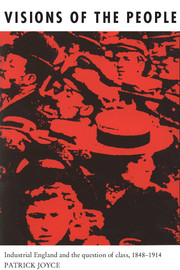Book contents
- Frontmatter
- Contents
- List of plates
- Acknowledgements
- 1 Introduction: beyond class?
- PART I POWER AND THE PEOPLE: POLITICS AND THE SOCIAL ORDER
- PART II MORALISING THE MARKET: WORK AND THE SOCIAL ORDER
- PART III CUSTOM, HISTORY, LANGUAGE: POPULAR CULTURE AND THE SOCIAL ORDER
- PART IV KINGDOMS OF THE MIND: THE IMAGINARY CONSTITUTION OF THE SOCIAL ORDER
- 9 Investigating popular art
- 10 The broadside ballad
- 11 The voice of the people? The character and development of dialect literature
- 12 Dialect and the making of social identity
- 13 Stages of class: popular theatre and the geography of belonging
- 14 Summary and conclusion: the making of the English working class before 1914?
- Appendices
- Bibliographical note
- Notes
- Index
13 - Stages of class: popular theatre and the geography of belonging
Published online by Cambridge University Press: 05 March 2012
- Frontmatter
- Contents
- List of plates
- Acknowledgements
- 1 Introduction: beyond class?
- PART I POWER AND THE PEOPLE: POLITICS AND THE SOCIAL ORDER
- PART II MORALISING THE MARKET: WORK AND THE SOCIAL ORDER
- PART III CUSTOM, HISTORY, LANGUAGE: POPULAR CULTURE AND THE SOCIAL ORDER
- PART IV KINGDOMS OF THE MIND: THE IMAGINARY CONSTITUTION OF THE SOCIAL ORDER
- 9 Investigating popular art
- 10 The broadside ballad
- 11 The voice of the people? The character and development of dialect literature
- 12 Dialect and the making of social identity
- 13 Stages of class: popular theatre and the geography of belonging
- 14 Summary and conclusion: the making of the English working class before 1914?
- Appendices
- Bibliographical note
- Notes
- Index
Summary
The music hall indicates a more indirect relationship between the creation and reception of popular art than was the case with ballads and dialect. Popular theatre, and particularly the music halls, came to have a fairly uniform character throughout the country. In terms of organisation and performance one can speak of a ‘national’ form of art. Paradoxically enough, the early century ballads have a kinship here, but even they when compared with the music hall indicate how progressively in the century regional differences might figure somewhat less than national similarities. The case of the music hall therefore brings out the whole question of the relationship between the different social and geographical stages – local, regional and national – upon which the senses of belonging and solidarity were played out at the time. What is evident is something much more complex than the eclipse of the local and the regional by the national. If in some respects regional and introspective, dialect also pointed outwards to broader national horizons as well. The example of dialect in fact illustrates how these different levels or stages might be complementary: rather than disparate aspects of ‘class’ development it is a relationship which is chiefly evident. The changing character of this relationship will be considered in due course: it will be evident that the regional stage was to continue to matter greatly.
- Type
- Chapter
- Information
- Visions of the PeopleIndustrial England and the Question of Class, c.1848–1914, pp. 305 - 328Publisher: Cambridge University PressPrint publication year: 1991



